Sri Lanka bank says fuel shortage set to ease as students protest
The central bank says it has secured foreign exchange to pay for fuel and cooking gas shipments as police clash with student protesters.
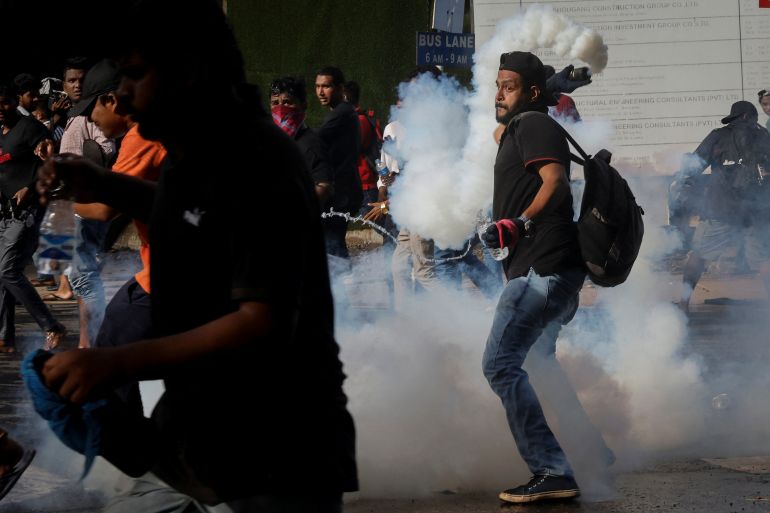
Sri Lanka’s central bank has secured foreign exchange to pay for fuel and cooking gas shipments that will ease crippling shortages, says its governor, as police fire tear gas and water cannon to push back student protesters.
Most of Sri Lanka’s petrol stations have run dry as the island nation battles its most devastating economic crisis since independence in 1948.
Keep reading
list of 4 itemsSri Lanka minister asks people not to queue for fuel for two days
Sri Lanka faces ‘man-made’ food crisis as farmers stop planting
No-confidence motion against Sri Lanka leader fails in parliament
At some pumps in the commercial capital, Colombo, on Thursday, dozens of people stood in lines holding plastic jerry cans, as troops in combat gear and armed with assault rifles patrolled the streets.
Traffic was extremely light. Residents said most people were staying at home because of the lack of transport.
Meanwhile, hundreds of students from the Inter University Students’ Federation carrying black flags marched on Colombo’s central Fort area, chanting slogans against the government. Police fired repeated rounds of tear gas and water cannon to push them back.
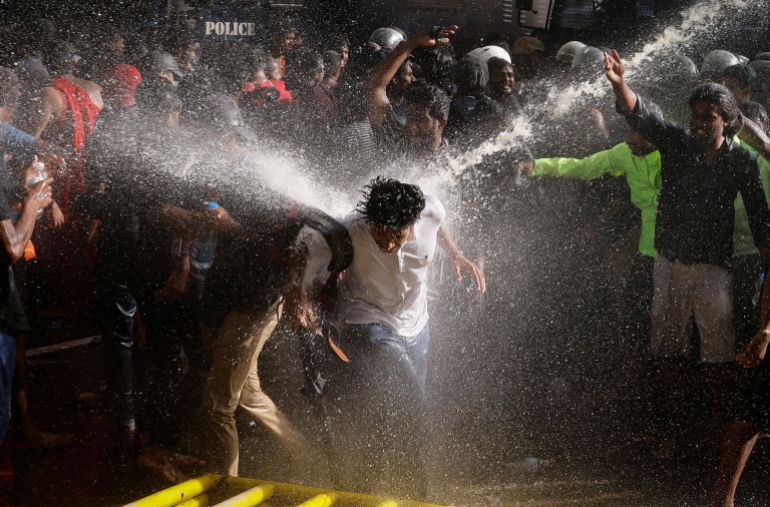
Limit on foreign currency holdings
Central bank Governor P Nandalal Weerasinghe told a news conference adequate dollars had been released to pay for fuel and cooking gas shipments, utilising in part $130m received from the World Bank and remittances from Sri Lankans working overseas.
He was speaking after the central bank held interest rates steady at a policy meeting, citing a massive 7 percentage point increase in April that it said was working its way through the system.
The central bank also said it will lower the maximum amount of foreign currency that individuals can possess to $10,000 from $15,000 and penalise anyone who holds it for more than three months.
Weerasinghe said people must place their excess foreign currency in a bank or convert it into local currency within two weeks. After that time, central bank officials and police will conduct raids and anyone violating the new rules will be fined, he said.
The country was more politically and economically stable, Weerasinghe said, adding that he would stay on in his post. He told reporters on May 11 he would resign in two weeks in the absence of political stability as any steps the bank took to address the economic crisis would not be successful amid the turmoil.
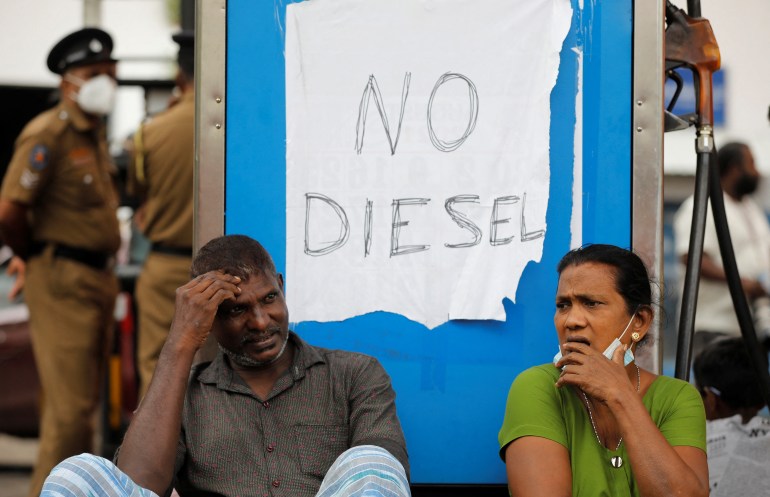
Opposition parliamentarian Ranil Wickremesinghe was named prime minister last week and he has made four cabinet appointments. However, he has yet to name a finance minister.
Inflation could rise further to a staggering 40 percent in the next couple of months but it was being driven largely by supply-side pressures and measures by the bank and government were already reining in demand-side inflation, the central bank governor added.
Inflation hit 29.8 percent in April with food prices up 46.6 percent year-on-year.
Sri Lanka’s economic crisis has come from the confluence of the COVID-19 pandemic battering the tourism-reliant economy, rising oil prices and populist tax cuts by the government of President Gotabaya Rajapaksa and his brother, Mahinda, who resigned as prime minister last week.
Other factors have included heavily subsidised domestic prices of fuel and a decision to ban the import of chemical fertilisers, which devastated the agriculture sector.
“This is an economy that hasn’t actually fully recovered from the pandemic yet,” said Christian De Guzman, senior vice president sovereign risk at Moody’s. “Tourism, which is one of their engines of growth, hasn’t come back.”
‘We cannot repay’
Sri Lanka is also officially now in default on its sovereign debt as a so-called grace period to make some already-overdue bond interest payments expired on Wednesday.
Weerasinghe said plans for a debt restructuring were almost finalised and he would be submitting a proposal to the cabinet soon.
“We are in preemptive default,” he said. “Our position is very clear, until there is a debt restructure, we cannot repay.”
The central bank said energy and utility prices needed to be urgently revised, and analysts said the prime minister’s ability to push reforms through parliament and overcome public anger would be crucial.
“They need to bring in critical reforms and other measures to parliament to test their support and see if they really have consensus and stability,” said Shehan Cooray, head of research at Acuity Stockbrokers in Colombo.
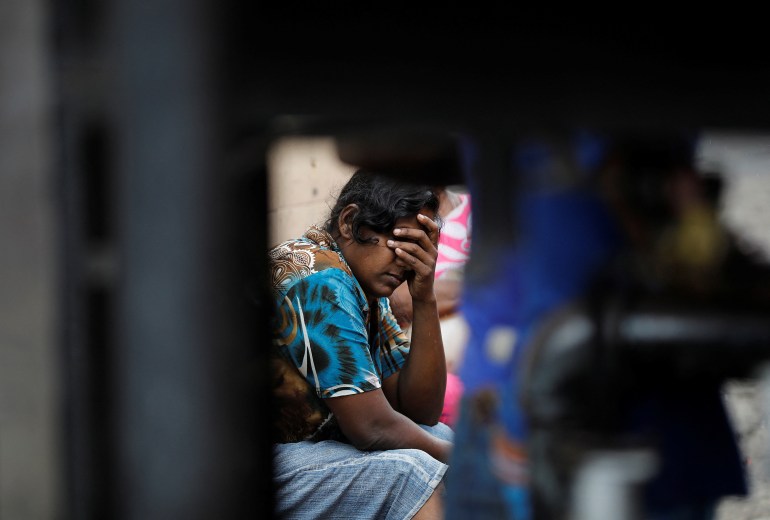
He added, however, that the situation had taken a turn for the better. “Given that there was a point where it was even difficult to find a governor, the fact that he has decided to remain is a good thing,” Cooray said.
A spokesperson for the International Monetary Fund said on Thursday the fund was monitoring developments closely and that a virtual mission to Sri Lanka was expected to conclude technical talks on a potential loan programme to the country on May 24.
Sri Lanka has suspended repayment of about $7bn in foreign loans due this year out of $25bn to be repaid by 2026. The country’s total foreign debt is $51bn. The finance ministry says the country currently has only $25m in usable foreign reserves.
Fuel shipments
Authorities have announced countrywide power cuts of up to four hours a day because they cannot supply enough fuel to power generating stations.
The government asked state employees not to go to work on Friday, except for those needed to maintain essential services, because of the fuel shortages.
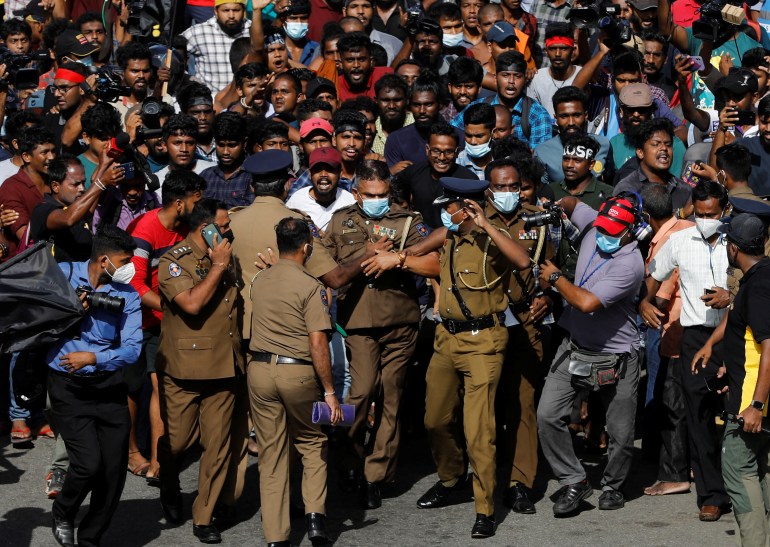
Wickremesinghe, speaking in parliament on Thursday, said the government was working to release six fuel shipments that had arrived at Colombo’s port.
“There are two petrol shipments among them but this will not end the shortages,” he said, adding that supplies had been locked in only until mid-June.
“Our aim now is to reduce the lines and find a way to start a fuel reserve so even if a couple of shipments are missed there is fuel available.”
However, there is considerable opposition to him. Protesters agitating for the removal of the Rajapaksa brothers say he is their stooge and continue to occupy the entrance to the president’s office for more than a month, calling for Gotabaya Rajapaksa to resign.
Months of anti-government rallies have led to the near-dismantling of the once-powerful ruling family, with one of the president’s brothers resigning as prime minister, and other siblings and a nephew leaving their cabinet posts.
Protesters accuse the Rajapaksas of triggering the crisis through corruption and misrule.